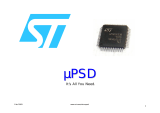
STK501
O
AVR Studio
®
Operated
O
Plug-in Module for STK500
(STK500 Required)
O
Serial In-System Programming
O
Parallel High-voltage Programming
O
Zero Insertion Force Socket for TQFP
Packages
O
All AVR I/O Ports Easily Acessible
through Pin Header Connector
O
Spare RS-232 Driver and Connector
O
Expansion Connectors for Plug-in
Modules and Prototype Areas
O
TQFP Footprint for Emulator Adapters
O
JTAG Connector for On-chip
Debugging using the JTAG ICE
O
Adds XRAM Support to the STK500
Board for Devices with XRAM Interface
O
On-board 32 kHz Clock Crystal for
Easy RTC Implementation
O
Target Voltage 2.7 – 6.0V
O
Powered by STK500
M
ICROCONTROLLERS
Expansion
Board
64-
PIN SUPPORT FOR
STK500
The STK501 board is an expansion module designed to add 64-pin support to the
Atmel
®
STK500 Development Board. The STK500 and STK501 expansion module
extends support to all current AVR
®
devices.
The STK501 includes connectors,
jumpers, and hardware allowing full
support for the new features on
ATmega103, ATmega64, and
ATmega128. The Zero Insertion Force
(ZIF) socket allows easy use of TQFP
packages. In addition to providing
support for new devices, the STK501
also adds support for peripherals
previously not supported by the
STK500. An additional RS-232 driver
and an XRAM interface are among the new features. Devices with dual UART or
XRAM interface can thus take advantage of the new resources on the STK501 board.

64-PIN AVR EXPANSION B OARD
STK501
©Atmel Corporation, 2002
Atmel Corporation makes no warranty for
the use of its products, other than those
expressly contained in the Company’s
standard warranty which is detailed in
Atmel’s Terms and Conditions located on
the Company’s web site. The Company
assumes no responsibility for any errors
which may appear in this document,
reserves the right to change devices or
specifications detailed herein at any time
without notice, and does not make any
commitment to update the information
contained herein. No licenses to patents or
other intellectual property of Atmel are
granted by the Company in connection
with the sale of Atmel products, expressly
or by implication. Atmel’s products are not
authorized for use as critical components
in life support devices or systems.
Atmel
®
, AVR
®
and AVR Studio
®
are regis-
tered trademarks of Atmel.
Other terms and products names may be
the trademarks of others.
2474B-AVR-09/02/15M
Corporate Headquarters
2325 Orchard Parkway
San Jose, CA 95131
USA
TEL: (1)(408) 441-0311
FAX: (1)(408) 487-2600
Europe
Atmel Sarl
Route des Arsenaux 41
Case Postale 80
CH-1705 Fribourg
Switzerland
TEL: (41) 26-426-5555
FAX: (41) 26-426-5500
Asia
Room 1219
Chinachem Golden Plaza
77 Mody Road Tsimshatsui
East Kowloon
Hong Kong
TEL: (852) 2721-9778
FAX: (852) 2722-1369
Japan
9F, Tonetsu Shinkawa Bldg.
1-24-8 Shinkawa
Chuo-ku, Tokyo 104-0033
Japan
TEL: (81) 3-3523-3551
FAX: (81) 3-3523-7581
e-mail
Web Site
http://www.atmel.com
The STK501 supports both the In-System Programming mode (ISP) and the High-voltage
Programming mode of its supported devices.
AVR Studio, Atmel’s front-end tool for the STK500 Development Board, provides support for
STK501.
O
Port E, F, and G headers for the additional
ports on the 64-pin ATmega103, ATmega64,
and ATmega128
O
Footprint for mounting an external SRAM on
the board directly connected to the XRAM
interface of the AVR device
O
External SRAM interface (including address
latch)
O
Additional RS-232 port for dual UART
devices
O
JTAG connector for On-chip emulation using
the JTAG ICE on supported devices
O
On-board 32 kHz clock crystal for easy imple-
mentation of Real Time clock applications
The STK501 board is a hardware expansion module for the STK500 Development
Board. The ZIF socket on the STK501 adds support for ATmega103, ATmega64, and
ATmega128 to the list of devices supported by the STK500. The STK500 supports
all megaAVR
®
, tinyAVR
™
, and classic AVR devices.
The STK500 board provides full programming and development support for the
ATmega103, ATmega64, and ATmega128. Additional ports and interfaces on the
STK500 have now been made available with the STK501. Among the new features are:
Ordering Information
The STK501 is available from Atmel franchised distributors.
The ordering code is ATSTK501.
The latest version of AVR Studio is available free of charge from Atmel web site: www.atmel.com
Supported Devices
ATmega103, ATmega64, and ATmega128
Note: Low voltage devices are also supported.
Note: STK501 is not a stand-alone product. STK500 is needed for operation.
/

